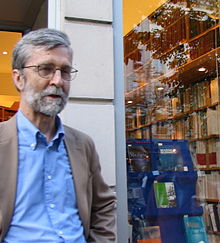John McDowell (philosopher)
John Henry McDowell (born March 7, 1942 in Boksburg , South Africa ) is a contemporary South African philosopher .
Life
McDowell studied at the University College of Rhodesia and Nyasaland and at New College in Oxford , where he also taught at University College from 1966 to 1986 . Since then he has been Professor of Philosophy at the University of Pittsburgh , since 1988 as a University Professor.
He has published publications in various fields of philosophy (for example in epistemology , metaethics or metaphysics ), where he develops his greatest impact in the philosophy of mind and the philosophy of language . In the 1970s he was instrumental in the project initiated by Donald Davidson to develop semantics for natural languages. His philosophy is strongly influenced by Ludwig Wittgenstein , Peter Frederick Strawson , David Wiggins , Gareth Evans and especially Wilfrid Sellars . In 1992 he was elected to the American Academy of Arts and Sciences .
In recent years, McDowell has excelled as an advocate of an externalist theory of mind; He takes the view that even due respect for scientific naturalism should not prevent us from interpreting our mental vocabulary as real - that is, as related to and descriptive of something in the world.
Works
Many of McDowell's important writings are summarized in the essay collections Mind, Value, and Reality (Cambridge, Massachusetts: Harvard University Press, 1998) and Meaning, Knowledge, and Reality (Cambridge, Massachusetts: Harvard University Press, 1998). A revised version of his John Locke Lectures appeared in 1994 under the title Mind and World (Cambridge, Massachusetts: Harvard University Press; republished and re-introduced in 1996). In this influential, but also very difficult work, McDowell developed a new, hotly debated approach to the empirical justification of our assumptions. He starts from the question of how experience can be used to test and justify (or reject) beliefs if one assumes a separation of a "logical space" of reasons from one of nature or empirical reality, which he considers reasonable . Apparently only the possibilities remained to succumb to a "myth of the given", which he under appeal and a. Rejected at Sellars and Wittgenstein, or completely shut off the system of beliefs from experience, which is just as unsatisfactory. His solution consists in declaring the two "logical spaces" to be connected insofar as the perception itself is conceptually structured, or with it conceptual abilities would have to be used. The resulting problem that animals and infants then obviously have to be denied perception, McDowell tries to solve following considerations by Aristotle and younger thinkers outside the analytical tradition, such as Karl Marx and Hans-Georg Gadamer . Animals do not perceive a "world" but only an "environment" in which they live and, without weighing up the reasons, react to immediate biological problems.
Many topics in McDowell's work were also taken up and further developed in a similar form by his Pittsburgh colleague Robert Brandom . Both in turn dealt intensively with Richard Rorty . For example, McDowell writes in his preface to Mind and World (p. Ix-x): "It will be obvious that Rorty's work is [...] central for the way I define my stance here".
Web links
- Literature by and about John McDowell in the catalog of the German National Library
- McDowell on the University of Pittsburgh home page
- McDowell's list of publications ( MS Word ; 73 kB)
- John McDowell: Reason and Nature . Lecture and Colloquium in Münster 1999
- Journal Teorema: Aspects of the Philosophy of John McDowell
- Paul Redding: The Analytic Neo-Hegelianism of John McDowell & Robert Brandom
literature
- Titus Stahl: Introduction to Metaethics. Stuttgart, Reclam 2013 (Reclams Universal Library No. 19137), ISBN 978-3-15-019137-8 , pp. 196–207 ("Morality as Second Nature - John McDowell")
- Georg Römpp : Philosophy of Science. An introduction. Cologne, Böhlau Verlag 2018 (UTB, No. 5048), ISBN 978-3-8385-5048-0 , pp. 85-101.
| personal data | |
|---|---|
| SURNAME | McDowell, John |
| ALTERNATIVE NAMES | McDowell, John Henry |
| BRIEF DESCRIPTION | South African philosopher |
| DATE OF BIRTH | March 7, 1942 |
| PLACE OF BIRTH | Boksburg , South Africa |
